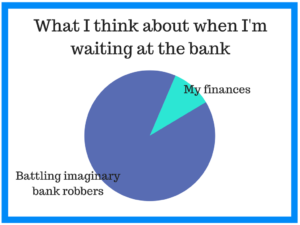

HOW TO TALK TO THE BANK
Ah, cashflow.
Nemesis of tradies everywhere.
Superman’s kryptonite.
Reason for high-stress levels.
Sleepless nights.
And root cause of arguments with your partner.
Whether cashflow is tight because…
- Your company is growing fast (meaning bigger outgoings every month, more uncompleted jobs you can’t invoice yet, and more clients owing you money)…
- Clients haven’t paid yet (or went broke on you)…
- Or things have got quiet…
Sometimes it can reach boiling point.
You feel like you’re banging your head against a brick wall.
Lack of money when you need it to pay your bills and keep on top of wages and somehow you need to find money to pay yourself.
When you get to that point, it can affect almost everything including which customers you take on, where you put your focus. It will restrict growth and how you look at opportunities for your business.
At worst, it will stop your business completely.
Left long enough it will even affect your home life, relationships, and your health.
The constant worry follows you around taunting you at work, in the car, at night, at home and even in the bedroom.
We’ve all been there.
Listen:
Don’t wait till the stress is extreme.
Every business should have solid systems so you know if a cashflow issue might be on the horizon.
However, if cashflow issues have come over the horizon and are now hurling towards you at lightning speed, you’ll want to stick with me…
Because when you need to have a friendly chat with the bank (or a serious one), you don’t want to be just turning up with trepidation and fear of the dreaded “No”.
You’ll get better results when you do it early, prepare right and understand what they’re looking for.
That’s how you can help them feel confident in your business, position the negotiations, and get the outcome you want.
Or at least walk out with your head held high.
So let’s get down to it:
#1. THE RIGHT START POINT
KNOW WHERE YOUR MONEY IS GOING
For starters (before you do anything) take a look at where your money is going:
- Check out your Profit & Loss to see if you are actually making money.
Ask yourself these questions:
- Are my customers all paying on time?
- Am I taking too much out of the business in drawings
- Am I buying expensive gear and vehicles I can’t afford?
Sort these kinds of things out first.
- Then complete a cashflow forecast to see how much you need in the next few months.
Consider: Can you get through – or do you really need more money?
Now that you know what is going on in your business, if you still need a loan, then it’s time to talk with the bank.
Do it early.
DO NOT wait till you need the money tonight or tomorrow.
Banks do not like that.
#2. THE RIGHT PREP
INCREASING YOUR CHANCES OF SUCCESS
I’ve dealt with a lot of bank managers over the years, with my businesses, and sometimes helping my 1 on 1 business coaching clients get loans themselves.
And guess what?
How you prepare will have a big effect on the outcome.
The bank needs to see that you know what you are doing.
That you are serious about getting your business right.
It means you are a better bet.
A bank manager’s job is to loan to businesses that will be able to pay it back. So they are always assessing how much risk you are to them.
The smaller the risk the more likely they are to lend you the money.
Show them that you are a safe bet.
How?
Here is a list of things to take along to your meeting (most of these they will ask you for anyway).
This is the first way to show them you are in control of your business
- Profit and Loss Report
- Accounts Receivable Report (who owes you money)
- Accounts Payable Report (who you owe money to)
- Cashflow Forecast (shows how much money you need and when you can pay it back)
- Your plan (what you are going to use the money for and how it will help the company perform better)
They know you are there because your cashflow is not working, so tell them why, along with your plan for getting back on track. This should be more than “hey your loan will fix it – till I need more next time”
#3. THE RIGHT PERSON
WHO TO DEAL WITH AT THE BANK
Here’s another clue:
Deal with the manager as they will most likely make the decisions.
If you have to deal with a call centre then negotiate to at least deal directly with the same person throughout the application.
But try to deal with your branch manager as you are more likely to get a better outcome.
They may be able to approve your loan or extension themselves, or they may need head office approval.
Either way, they are ultimately responsible to a manager above them if it goes wrong, so make sure to communicate your plan well enough for them to explain to others if necessary.
A new trend seems to be that bank managers get moved around to different branches a lot, so make sure you get to know the new manager – your aim is to build a relationship with them so they get to know you before you need their money.
If you don’t get on with that manager discretely inquire if there is anyone else you could deal with instead.
#4. THE RIGHT MINSET
HOW TO APPROACH THINGS
- Be positive.
- Be confident in your business and your plan.
- Remember you know your business better than they do. And that is one of your biggest advantages.
- Listen – they may have a perspective you hadn’t thought of.
- Be honest. Don’t try to hide anything that will affect your application. They don’t need to know every trade secret. But they will want to know anything relevant to your loan.
- Think long term. You want a bank that believes in what you are doing and you want your record to show integrity. Keep a clean record so that next time you need them, they are more likely to be there.
As business owners, there is a lot at stake. This is our livelihood, how we feed our families. And staff and many others rely on us to get it right too.
Not to mention, when we need to see the bank, we’re probably at a point of frustration and are totally stressed out.
So it’s easy to see the bank as the enemy. It can feel like the “young corporate-minded bankers just don’t understand or care.”
The fact of the matter is, the bank isn’t our friend or our enemy.
They simply have to follow the systems and the rules.
Figure out how to use that knowledge to your advantage.
I’ve met many helpful people at the bank, who do care and will try their best to help if they can see a good plan is in place.
And remember:
Banks say “Yes” more often than “No”.
#5. THE RIGHT BANK
WHAT OTHER BANKS MIGHT OFFER
Here’s the interesting thing: I have found that often the same application will be accepted by one bank but not another.
So if you find that your current bank is just not paying ball, then it could be time to shop around.
Banks are always looking for new business and are judged on what new business they bring in, so most will be happy to talk with you.
Check out other options or even see a broker or financial advisor (there are some who specialise in business). A good broker/financial advisor will know which banks will be more likely to suit your business and what they are looking for.
Some of my clients had success with them even when their bank said no.
#6. THE RIGHT BACKUP PLAN
Having a backup plan will take the pressure off when you are in negotiations with your bank.
If you know there is a plan B as a last resort you will be much more confident when dealing with the bank and in my experience more likely to get the loan.
And if they just will not agree to help, at least you have options.
Here are some other options (some of these are good practice anyway)
- Restrict growth (take less larger projects) for a while till cashflow catches up
- Put your prices up
- Go after more jobs that give you good $$ upfront
- Change terms with clients to get deposits and earlier progress payments
- Sell something you’re not using
- Factoring (selling your outstanding accounts to a factoring company at a discount)
- Reduce expenses
- Negotiate with suppliers for longer payment terms
- Change your payments to yearly (insurance, ACC, etc)
- Reduce staff
- Increase loan against your house or other personal assets (be careful with this one)
- Get an investor
- Get advice from your accountant or professional business consultant
BREATHING SPACE
What happens once you have some breathing space and the cashflow pressure is off?
It will free you up to start working on the business again – things look different with less stress.
A little stress is good, but too much of the wrong kind negatively affects you and your business. Bad cashflow is the wrong kind of stress!
If you are successful in getting a loan or more overdraft, there are some ground rules: Know where your money is going, don’t spend it on things you don’t need and plan to pay it back as soon as practical.
If you need a loan to take the pressure off and get your business going again – go for it. But remember in the long term, the less debt you have, the better.
THE FINAL WORD
Always have solid cashflow systems in place, no matter where your business is at.
This way you’ll see what’s coming – no tight spots and no nasty surprises.
There are lots of ways to improve cashflow so you don’t get to crisis point.
But that’s another story.
Looking to get ahead? Learn how to earn more and work less in your trades biz by avoiding the common pitfalls: get free e-book now
GET MY FREE GUIDE: "The 11 Biggest Tradie Business Mistakes & How To Fix Them"
Avoid the common pitfalls that cost you jobs, drain your hard earned cash, and rob you of time with your family.














